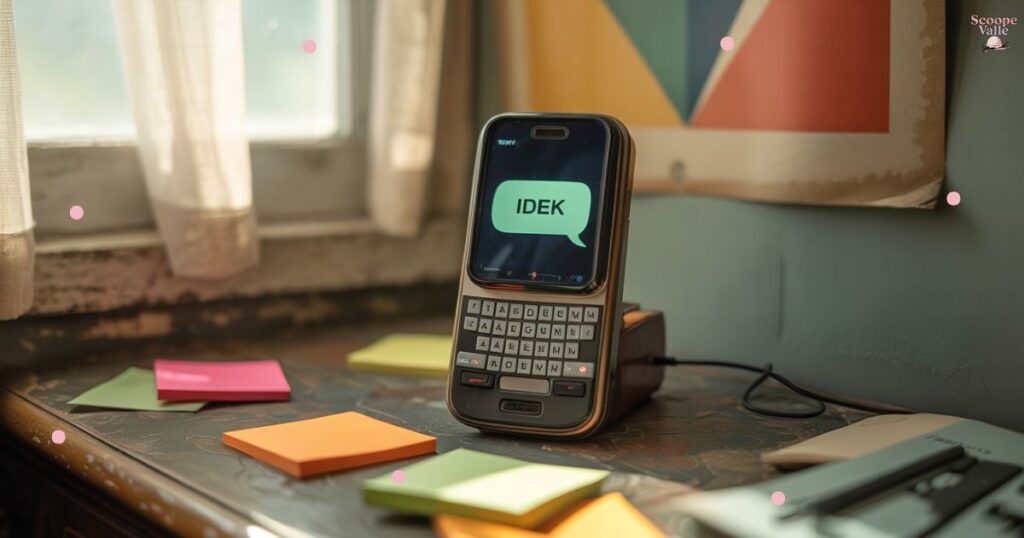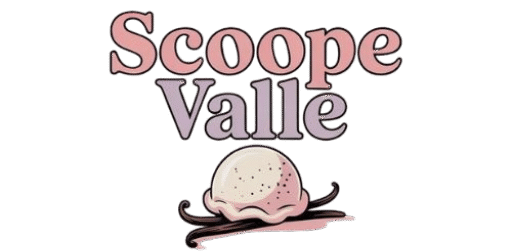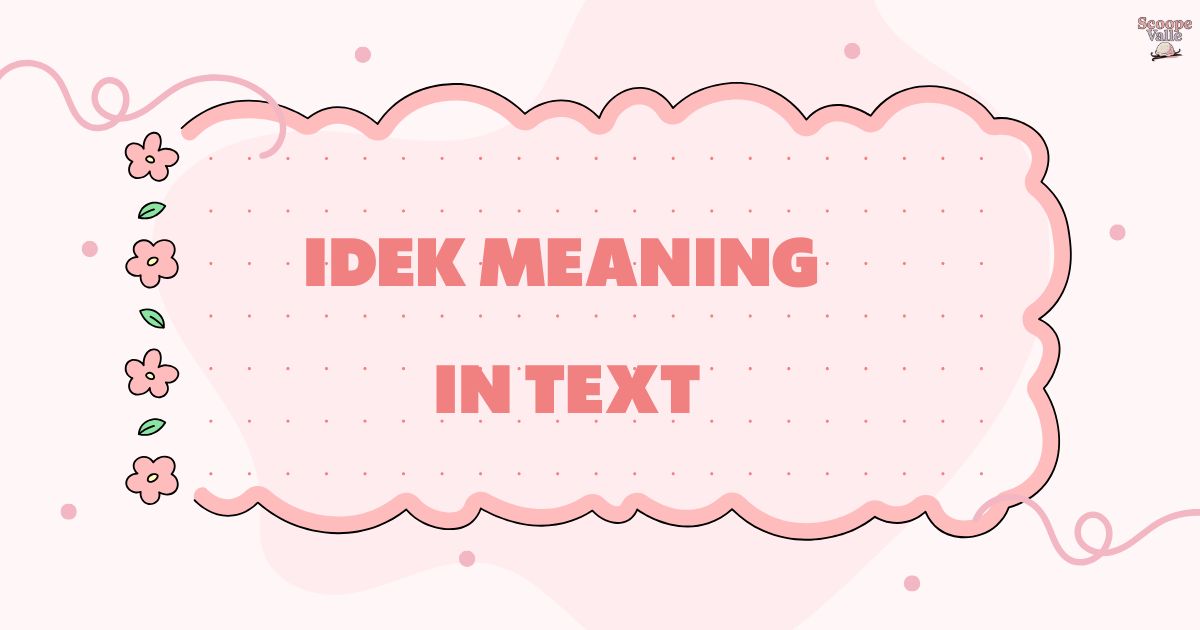Slang terms and acronyms pop up everywhere in digital conversations. If you’ve come across “idek” while scrolling through messages or social media, you may have stopped and asked yourself: “What does this even mean?” Don’t worry you’re not the only one.
This guide breaks down the meaning of “idek,” how people use it in different settings, and how you can respond without feeling left out. Let’s dive in!
Definition & Meaning
“idek” stands for “I don’t even know.” It’s more than just a short form of words it conveys emotions like confusion, disbelief, or indifference. While “idk” simply means “I don’t know,” the extra “even” adds intensity. It often shows that the person is overwhelmed or doesn’t have the energy to explain further.
For example:
- “idek how I managed to forget my wallet again.”
- “idek what that movie ending was supposed to mean.”
Examples in Real Conversations
To understand “idek” better, let’s look at it in different types of conversations.
Group chat with friends
- Friend 1: “Did you see Mark’s hairstyle today?”
- Friend 2: “Yeah, idek what he was going for.”
Family text
- Mom: “Why is the Wi-Fi acting up again?”
- Teen: “idek, maybe it hates us.”
Work break room
- Coworker A: “They moved the deadline again.”
- Coworker B: “idek what’s going on anymore.”
Also read: WYGG Meaning in Text: Your Fun Guide to This Trendy Acronym
Background & History
Like most online acronyms, “idek” started in the early 2000s when texting and instant messaging were at their peak. Because phones had character limits, people shortened words to save time.
- Early 2000s: Appeared in MSN Messenger, AIM, and old-school text messages.
- 2010s: Spread widely through Tumblr and Twitter, where dramatic and exaggerated tones were common.
- Today: Common among Gen Z, Millennials, and meme culture. You’ll see it in tweets, TikTok captions, gaming chats, and even Instagram comments.
Usage in Different Contexts

1. Texting & Social Media
In casual chats, “idek” is perfect for expressing uncertainty or mild frustration.
- “idek what to have for lunch—everything feels boring.”
- “She just left the party without saying bye, idek why.”
On platforms like TikTok, users also use “idek” in captions to make their posts relatable:
- “idek why I thought cutting my own bangs was a good idea 😭.”
2. Gaming
Gamers use “idek” often when something unexpected happens.
- After losing unfairly: “We had the lead and then—idek what happened.”
- When confused about updates: “idek how to use these new weapons yet.”
It’s quick, easy, and fits the fast pace of in-game chats.
3. Dating Apps (Tinder, Bumble)
On dating apps, people sometimes use “idek” in a flirty or self-deprecating way.
- Bio: “idek why I’m here, but maybe I’ll find someone cool.”
- Chat:
- Person A: “What’s your favorite movie?”
- Person B: “idek, I change my mind every week.”
Common Misconceptions
Because “idek” is close to “idk,” people often confuse the two. Let’s clear it up:
- Myth: It’s the same as “idk.”
Truth: “idek” shows stronger emotion, like disbelief or exasperation. - Myth: It’s always negative.
Truth: Not true! It can also be playful. For example: “idek what’s happening in this concert but I’m having fun.”
Similar Terms & Alternatives
| Term | Meaning | Difference |
|---|---|---|
| idk | I don’t know | Neutral and plain |
| wtf | What the f*** | Stronger frustration |
| smh | Shaking my head | Disappointment |
| fr | For real | Used to emphasize agreement or disbelief |
How to Respond to “idek”
How you respond depends on the tone of the conversation:
- Casual:
Friend: “idek what to eat.”
You: “Same, nothing sounds good.” - Funny:
Friend: “idek how I failed that test.”
You: “Maybe the teacher failed you, not the other way around.” - Supportive:
Friend: “idek how to deal with this right now.”
You: “I get it, want to talk about it?”
Regional & Cultural Differences
In English-speaking countries like the US and UK, “idek” is common in online messaging. But in other regions, people may use different acronyms.
- Spanish: “Ni idea” means “no idea.”
- French: “Je sais pas” or “jsp” is used in texts.
- German: “Ka” (short for “keine Ahnung”) means “no clue.”
So, while “idek” is mostly English slang, the feeling it expresses is universal.
Is It Offensive?
Generally, no—“idek” is harmless. But context is important.
- Playful: “idek why this show is so addictive 😂.”
- Harsh: “idek why I still talk to you.”
The second example could hurt feelings depending on the tone.
Professional Settings?
Using “idek” at work or in formal communication isn’t recommended. In professional emails, stick to clear alternatives like:
- “I’m not sure.”
- “I’ll have to double-check.”
- “I don’t know the answer at the moment.”
Slang like “idek” might seem unprofessional and confuse colleagues who aren’t familiar with internet acronyms.
FAQ’s
Is “idek” rude?
Not usually. It depends on toneif said jokingly, it’s fine. If said in anger, it might sound dismissive.
Can I use it in school essays or work emails?
No. Save “idek” for casual chats, social media, or memes.
Is “idek” the same as “idk”?
No. “idek” adds emotion it shows confusion, disbelief, or frustration, not just uncertainty.
Who uses “idek” the most?
Mostly younger generations Gen Z and Millennials but it’s spreading across all age groups online.
Can it be funny?
Absolutely! People often use “idek” with memes, jokes, or sarcastic posts to make others laugh.
Conclusion
“idek” is a simple but expressive piece of internet slang. It shows more than uncertainty—it reflects emotion, whether it’s frustration, disbelief, or just playful confusion. While it’s great for texting, memes, and casual conversations, it doesn’t belong in professional communication.
Next time you see someone write “idek,” you won’t feel lost. In fact, you might even use it yourself when words fail and all you can say is: “I don’t even know.”
Tylor John, with five years’ experience, beautifully crafts information on all topics and inspiring readers worldwide with positivity, faith, creativity, love, and hope.

